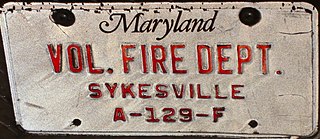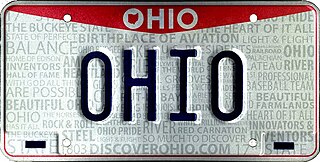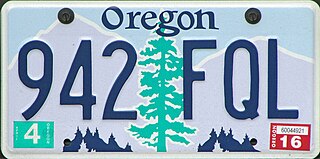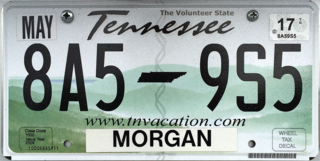 W
WThe U.S. state of Alabama first required its residents to register their motor vehicles and display license plates in 1911.
 W
WThe U.S. state of Arkansas first required its residents to register their motor vehicles and display license plates in 1911. Prior to 1911, plates were issued by cities.
 W
WThe U.S. state of California first required its residents to register their motor vehicles in 1905. Registrants provided their own license plates for display until 1914, when the state began to issue plates. Plates are currently issued by the California Department of Motor Vehicles.
 W
WThe U.S. state of Colorado first required its residents to register their motor vehicles and display license plates in 1913. As of 2021, plates are issued by the Colorado Department of Revenue through its Division of Motor Vehicles. Front and rear plates are required for most classes of vehicles, while only rear plates are required for motorcycles and trailers.
 W
WThe U.S. state of Connecticut first required its residents to register their motor vehicles in 1903. Registrants provided their own license plates for display until 1905, when the state began to issue plates. Since then, Connecticut has used a variety of license plate designs, and has issued different designs for passenger, non-passenger, and, more recently, optional plate types that often require an additional fee. As of 2021, plates are issued by the Connecticut Department of Motor Vehicles.
 W
WThe U.S. state of Delaware first required its residents to register their motor vehicles in 1905. Registrants provided their own license plates for display until 1909, when the state began to issue plates.
 W
WThe U.S. state of Florida first required its residents to register their motor vehicles in 1905. Registrants provided their own license plates for display until 1918, when the state began to issue plates, becoming the last of the contiguous 48 states to do so.
 W
WHawaii first required its residents to register their motor vehicles and display license plates in 1922, while still an organized incorporated territory of the United States. It was admitted to the Union as the 50th state in August 1959.
 W
WThe U.S. state of Idaho first required its residents to register their motor vehicles and display license plates in 1913. Plates are currently issued by the Idaho Transportation Department through its Division of Motor Vehicles. Front and rear plates are required for most classes of vehicles, while only rear plates are required for motorcycles and trailers.
 W
WThe U.S. state of Illinois first required its residents to register their motor vehicles in 1907. Registrants provided their own license plates for display until 1911, when the state began to issue plates. As of 2021, plates are issued by the Illinois Secretary of State.
 W
WThe U.S. state of Iowa first required its residents to register their motor vehicles in 1904. Registrants provided their own license plates for display until 1911, when the state began to issue plates.
 W
WThe U.S. state of Kansas first required its residents to register their vehicles and display license plates in 1913. Plates are currently issued by the Kansas Department of Revenue through its Division of Vehicles. Only rear plates have been required since 1956.
 W
WThe U.S. state of Maine first required its residents to register their motor vehicles and display license plates in 1905. As of 2021, plates are issued by the Maine Bureau of Motor Vehicles, within the office of the Department of the Secretary of State. Front and rear plates are required for most classes of vehicles, while only rear plates are required for motorcycles and trailers.
 W
WThe U.S. state of Maryland offers a large number of non-passenger and special vehicle registration plates. Each type uses a two-, three-, or four-letter prefix or suffix. Organizational plates may be displayed on passenger cars, multi-purpose vehicles, and trucks weighing 10,000 pounds and less, and some types are also available for use on motorcycles. On plates displaying a logo at left, the prefix or suffix is displayed vertically, while on plates that do not display a logo, the prefix is displayed horizontally. Logo plates have a $25 one time fee, while non-logo plates have a $15 one time fee, unless the plate is issued to a vehicle belonging to a member of a volunteer fire department or a Disabled American Veteran.
 W
WMassachusetts was the first U.S. state to issue license plates, on September 1, 1903. Plates are currently issued by the Massachusetts Registry of Motor Vehicles (RMV).
 W
WThe U.S. state of Michigan first required its residents to register their motor vehicles in 1905. Registrants provided their own license plates for display until 1910, when the state began to issue plates.
 W
WThe U.S. state of Minnesota first required its residents to register their motor vehicles in 1903. Registrants provided their own license plates for display until 1909, when the state began to issue plates.
 W
WThe U.S. state of Missouri first required its residents to register their motor vehicles in 1907. Registrants provided their own license plates for display until 1911, when the state began to issue plates.
 W
WThe U.S. state of Nebraska first required its residents to register their motor vehicles in 1905. Registrants provided their own license plates for display until 1915, when the state began to issue plates.
 W
WThe U.S. state of Nevada first required its residents to register their motor vehicles in 1913. Registrants provided their own license plates for display until 1916, when the state began to issue plates.
 W
WThe U.S. state of New Jersey first required its residents to register their motor vehicles in 1903. Registrants provided their own license plates for display until 1908, when the state began to issue plates.
 W
WThe U.S. state of New Mexico first required its residents to register their motor vehicles and display license plates in 1912. Plates are currently issued by the Motor Vehicle Division of the New Mexico Taxation and Revenue Department. Only rear plates have been required since 1961.
 W
WThe U.S. state of North Carolina first required its residents to register their motor vehicles in 1907. Registrants provided their own license plates for display until 1913, when the state began to issue plates.
 W
WThe U.S. state of Ohio first required its residents to register their motor vehicles and display license plates in 1908, although several cities within the state issued their own license plates from as early as 1902.
 W
WThe U.S. state of Oregon first required its residents to register their motor vehicles in 1905. Registrants provided their own license plates for display until 1911, when the state began to issue plates.
 W
WThe U.S. state of Pennsylvania first required its residents to register their motor vehicles in 1903. Registrants provided their own license plates for display until 1906, when the state began to issue plates.
 W
WThe U.S. state of Rhode Island first required its residents to register their motor vehicles and display license plates in 1904. Plates are currently issued by the Rhode Island Department of Revenue through its Division of Motor Vehicles. Front and rear plates are required for most classes of vehicles, while only rear plates are required for motorcycles and trailers.
 W
WThe U.S. state of South Carolina first required its residents to register their motor vehicles and display license plates in 1917. As of 2021, plates are issued by the South Carolina Department of Motor Vehicles. Only rear plates have been required since 1975.
 W
WThe U.S. state of Tennessee first required its residents to register their motor vehicles in 1905. Registrants provided their own license plates for display until 1915, when the state began to issue plates.
 W
WThe U.S. state of Texas first required its residents to register their motor vehicles in 1907. Registrants provided their own license plates for display, with serial numbers assigned by their county of residence, until the state began to issue plates in 1917.
 W
WThe U.S. state of Utah first required its residents to register their motor vehicles in 1909. Registrants provided their own license plates for display until 1915, when the state began to issue plates.
 W
WThe U.S. state of Vermont first required its residents to register their motor vehicles and display license plates in 1905. As of 2021, plates are issued by the Vermont Department of Motor Vehicles (DMV), associated with the Vermont Agency of Transportation. Front and rear plates are required for most classes of vehicles, while only rear plates are required for motorcycles and trailers.
 W
WThe U.S. state of Washington first required its residents to register their motor vehicles in 1905. Registrants provided their own license plates for display until 1915, when the state began to issue plates.
 W
WThe U.S. state of West Virginia first required its residents to register their motor vehicles and display license plates in 1905. As of 2021, plates are issued by the West Virginia Department of Transportation through its Division of Motor Vehicles. Only rear plates have been required since 1944.
 W
WThe U.S. state of Wyoming first required its residents to register their motor vehicles and display license plates in 1913. As of 2021, plates are issued and regulated by the Wyoming Department of Transportation through its Motor Vehicle Services division.